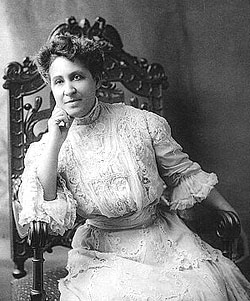
In 1913, NAWSA held a suffrage rally in which Terrell led the Delta Sigma Theta Sorority women of Howard University.
Active in the Republican Party, she was president of the Women’s Republican League during Warren G. Harding’s 1920 presidential campaign and the first election in which primarily white American women were given the right to vote. The Southern states from 1890 to 1908 passed voter registration and election laws that disenfranchised African-Americans of their right to vote. These restrictions were not fully overturned until after Congressional passage of the Voting Rights Act of 1965.
In 1892, Terrell with Helen Appo Cook, Ida B. Bailey, Anna Julie Cooper, Charlotte Forten Grimké, Mary Jane Peterson and Evelyn Shaw formed the Colored Women’s League in Washington, D.C. The goals of the service-oriented club were to promote unity, social progress and the best interests of the African American community. Cook was elected president. The Colored Women’s League aided in elevating the lives of educated black women outside of a church setting. Around the same time, a group of progressive black women was gathering in Boston, Massachusetts under the direction of suffragist and intellectual Josephine St. Pierre Ruffin under the name Federation of Afro-American Women. As both organizations had similar ambitions and audiences, Terrell and Ruffin decided to combine their efforts with hundreds of other organizations to reach a wider focus of black women workers, students, and activists nearing the beginning of the 20th century. Out of this union formed the National Association of Colored Women, which became the first secular national organization dedicated to the livelihoods of black women in America.
In 1896, Terrell became the first president of the newly formed National Association of Colored Women (NACW), whose members created day nurseries and kindergartens for black children. That same year, she also founded the National Association of College Women, which later became the National Association of University Women (NAUW). The League started a training program and kindergarten before these were included in the Washington, DC public schools.
Combined with her achievements as a principal, the success of the League’s educational initiatives led to Terrell’s appointment to the District of Columbia Board of Education which she held from 1895 to 1906. She was the first black woman in the United States to hold such a position.
Historians have generally emphasized Terrell’s role as a community leader and civil rights and women’s rights activist during the Progressive Era. She learned about women’s rights while at Oberlin, where she became familiar with Susan B. Anthony’s activism.
She also had a prosperous career as a journalist (she identified as a writer). Using the pen name Euphemia Kirk, she published in both the black and white press to promote the African American Women’s Club Movement. She wrote for a variety of newspapers “published either by or in the interest of colored people,” such as the A.M.E. Church Review of Philadelphia, Pennsylvania; the Southern Workman of Hampton, Virginia; the Indianapolis Freeman; the Afro-American of Baltimore; the Washington Tribune; the Chicago Defender; the New York Age; the Voice of the Negro; the Women’s World; and the Norfolk Journal and Guide. She also contributed to the Washington Evening Star and the Washington Post.
Terrell aligned the African-American Women’s Club Movement with the broader struggle of black women and black people for equality. In 1892, she was elected as the first woman president of the prominent Washington DC black debate organization Bethel Literary and Historical Society
Through her father, Terrell met Booker T. Washington, director of the influential Tuskegee Institute in Alabama. At the age of 17, when she was enrolled at Oberlin, she also met activist Frederick Douglass at President James Garfield’s inaugural gala. She became especially close with Douglass and worked with him on several civil rights campaigns. Shortly after her marriage to Robert Terrell, she considered retiring from activism to focus on family life. Douglass, making the case that her talent was too immense to go unused, persuaded her to stay in public life.
In 1904, Terrell was invited to speak at the International Congress of Women, held in Berlin, Germany. She was the only black woman at the conference. She received an enthusiastic ovation when she honored the host nation by delivering her address in German. She delivered the speech in French and concluded with the English version.
In 1909, Terrell was one of two black women (journalist Ida B. Wells-Barnett was the other) invited to sign the “Call” and to attend the first organizational meeting of the National Association for the Advancement of Colored People (NAACP), becoming a founding member. In 1913–14, she helped organize the Delta Sigma Theta sorority. More than a quarter-century later, she helped write its creed that set up a code of conduct for black women.
